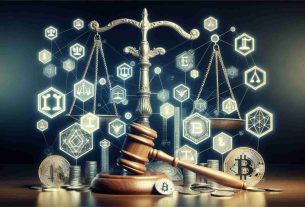The architectural evolution of blockchain technology has been significantly shaped by figures like Dominic Williams, founder of DFINITY since 2013. His insight into the developments of this emerging field reveals a transition towards multifaceted functionality within blockchain networks, a stark contrast to Bitcoin’s original intent as a ‘digital gold’ platform.
Emphasizing the revolutionary facets of smart contract technology, Williams explains their robust nature – ensuring correct execution free from tampering or unexpected stops. The security implications of such features are imperative in an era where cyber vulnerabilities present multi-trillion-dollar risks to the global economy.
Williams outlines the resilience and autonomy of smart contracts, guaranteeing not only security but also continuity of operation. These contracts are designed not to fail, preventing data loss and crashes that plague traditional software reliant on servers and file storage systems.
Applying blockchain to practical use cases, Williams showcases OpenChat, a decentralized communication platform that exemplifies the transparency and security of blockchain transactions. He also remarks on the Internet Computer’s integration with other blockchains, improving versatility and application scope without the need for intermediaries.
Dfinity’s commitment to pioneering the blockchain landscape is evident as Williams discusses the dedication of resources, including a thousand person-years of R&D and a team of countless PhDs, all contributing to the robust, scalable, and resilient Internet Computer blockchain. This technological feat aims to host complex, fully on-chain systems, ranging from social networks to enterprise solutions.
Full stack decentralization as the future, Williams contrasts the Internet Computer’s comprehensive blockchain framework with those that rely on centralized cloud services like AWS. By hosting every element, from user interface to data storage, directly on the blockchain, the Internet Computer ensures sovereignty and a true break from traditional reliance on centralized infrastructures.
Furthermore, Williams touches on how smart contracts can harness artificial intelligence (AI), augmenting their capabilities. AI-driven smart contracts could redefine decentralized finance (DeFi) and Web3 applications, offering secure and unstoppable performance, even when applying complex computations like those required by the legal sector in intelligent documentation analysis.
Advantages of Decentralized Software and Smart Contract Technology:
– Enhanced Security: Smart contracts operate with stringent protocols that minimize the risk of tampering and interference. This is far more secure compared to traditional systems which are vulnerable to hacks and unauthorized access.
– Autonomy and Resilience: Decentralized applications (DApps) run on smart contracts that are designed to prevent crashes and data loss, ensuring continuous operation without dependency on central servers.
– Transparency: Blockchain transactions are transparent and verifiable by anyone, which fosters trust in the system and reduces the possibility of fraud.
– Interoperability: The integration of various blockchains allows for a seamless experience and expands the potential use cases of decentralized applications, enabling them to serve a wider range of purposes.
– Full stack decentralization: By eschewing centralized cloud services, decentralized platforms offer sovereignty from tech giants and a decrease in single points of failure.
Disadvantages of Decentralized Software and Smart Contract Technology:
– Scalability: One of the biggest challenges facing blockchains is scalability. Ensuring that a decentralized platform can handle large numbers of transactions is still an ongoing issue.
– Complexity and usability: The complexity of blockchain technology can be a barrier to adoption for the average user. User-friendly interfaces and education are crucial to expanding the user base.
– Energy Consumption: The energy consumption and environmental impact of blockchain platforms, especially those that rely on proof-of-work (like Bitcoin), can be significant.
Key Questions and Challenges:
– How can scalability be achieved without compromising on decentralization? Achieving scalability while maintaining the decentralized nature of blockchain is a significant technical hurdle.
– What are the governance models for decentralized software, and how do they ensure fairness and efficiency? Decentralized governance remains a complex issue, with various models being experimented with to find the most effective systems.
– How can decentralized platforms be made more user-friendly? For widespread adoption, the technology needs to be accessible to those without technical expertise.
Controversies:
– Decentralization vs. Regulation: There’s a fine line between maintaining the decentralized ethos of blockchain and adhering to governmental regulations designed to protect users.
– Risk of Smart Contract Flaws: Despite their security benefits, if a smart contract is poorly written, it can contain bugs that could be exploited, leading to significant losses.
For further reading and exploration into decentralized software and blockchain technology, check out the following resources:
– Dfinity Foundation
– Ethereum
– Bitcoin



